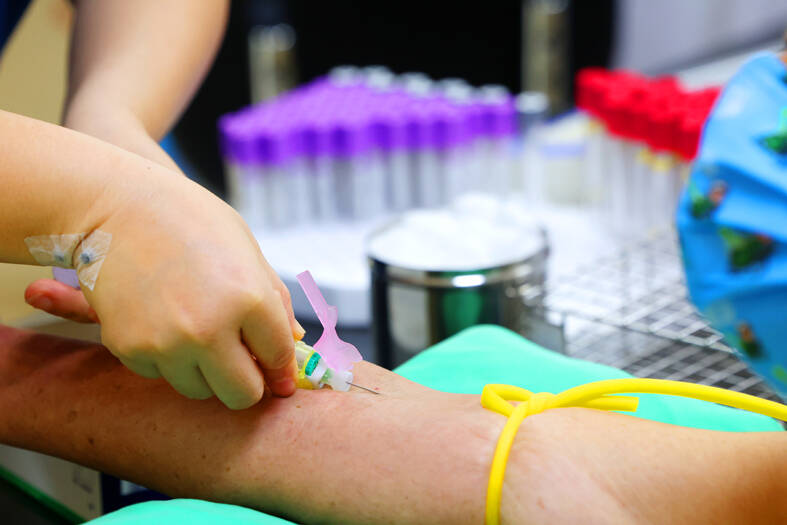The Health Promotion Administration yesterday said its Nutrition and Health Survey in Taiwan (NAHSIT) interviewers would acquire the consent of participants before performing checkups, and they would not take blood samples in the participants’ home, after a woman complained on Facebook about interviewers’ alleged conduct.
A woman on Thursday shared a letter on Facebook allegedly from Academia Sinica’s NAHSIT team, commissioned by the agency to perform the survey.
About three months ago, an Academia Sinica researcher visited her home, holding an official document and asked to take blood samples of her child, the woman wrote.

Photo: CNA
The researcher had the child’s personal information, so she questioned the authenticity and safety of the survey, she added.
When she refused to let her child’s blood be drawn, the interviewer said the borough warden and local public health center had been informed and asked why she refused, she wrote.
The agency on Friday said the survey is conducted according to the Nutrition and Healthy Diet Promotion Act (營養及健康飲食促進法), and it commissions an academic institute every four years, with Academia Sinica conducting it from 2021 to last year.
The Executive Yuan’s Directorate-General of Budget, Accounting and Statistics, and an institutional review board (IRB) approved the survey, it said, adding that professionally trained interviewers would acquire the participants’ signature of consent before conducting surveys and checkups, and that personal data are stored confidentially.
Local media on Friday last week reported that an official, responding to the incident, said that participants “might as well consider it a free health exam, as it is fairly expensive to get at a hospital.”
The Human Subject Protection Association in Taiwan on Saturday issued a statement condemning the Health Promotion Administration for allegedly misleading people by mentioning a “free health exam.”
When people have doubts about participating in the survey, the agency should clarify whether the survey had been conducted strictly according to an IRB-approved protocol and respect people’s right to reject, rather than misleading them and trying to convince them to get a “free health exam,” the association said.
The Health Promotion Administration on Sunday apologized for the case causing distress to people, saying that it would reflect and improve its operational procedures, as well as strengthen its interviewers’ capability to explain the survey and protect interviewees’ rights.
The agency’s Surveillance, Research and Health Education Division Director Lin Yi-ching (林宜靜) yesterday said the NAHSIT interviewers would certainly obtain participants’ signature of consent before conducting a survey and arranging a checkup for them.
Checkups, including physical examination and blood tests, would be conducted by healthcare professionals, so they would not be performed at participants’ homes, Lin said.
With scams becoming rampant over the past few years, it is a good thing that people have become more vigilant, she said.
However, it also creates more obstacles for governmental surveys, as rejection rates by targeted participants have been increasing consistently, she said.
The agency would continue to promote the NAHSIT and explain it to people, and hopefully more people would understand the survey’s importance and be willing to participate in it, she added.

The Coast Guard Administration (CGA) yesterday said it had deployed patrol vessels to expel a China Coast Guard ship and a Chinese fishing boat near Pratas Island (Dongsha Island, 東沙群島) in the South China Sea. The China Coast Guard vessel was 28 nautical miles (52km) northeast of Pratas at 6:15am on Thursday, approaching the island’s restricted waters, which extend 24 nautical miles from its shoreline, the CGA’s Dongsha-Nansha Branch said in a statement. The Tainan, a 2,000-tonne cutter, was deployed by the CGA to shadow the Chinese ship, which left the area at 2:39pm on Friday, the statement said. At 6:31pm on Friday,

The Chinese People’s Liberation Army Navy’s (PLAN) third aircraft carrier, the Fujian, would pose a steep challenge to Taiwan’s ability to defend itself against a full-scale invasion, a defense expert said yesterday. Institute of National Defense and Security Research analyst Chieh Chung (揭仲) made the comment hours after the PLAN confirmed the carrier recently passed through the Taiwan Strait to conduct “scientific research tests and training missions” in the South China Sea. China has two carriers in operation — the Liaoning and the Shandong — with the Fujian undergoing sea trials. Although the PLAN needs time to train the Fujian’s air wing and

The American Institute in Taiwan (AIT) put Taiwan in danger, Ma Ying-jeou Foundation director Hsiao Hsu-tsen (蕭旭岑) said yesterday, hours after the de facto US embassy said that Beijing had misinterpreted World War II-era documents to isolate Taiwan. The AIT’s comments harmed the Republic of China’s (ROC) national interests and contradicted a part of the “six assurances” stipulating that the US would not change its official position on Taiwan’s sovereignty, Hsiao said. The “six assurances,” which were given by then-US president Ronald Reagan to Taiwan in 1982, say that Washington would not set a date for ending arm sales to Taiwan, consult

A Taiwanese academic yesterday said that Chinese Ambassador to Denmark Wang Xuefeng (王雪峰) disrespected Denmark and Japan when he earlier this year allegedly asked Japan’s embassy to make Taiwan’s representatives leave an event in Copenhagen. The Danish-language Berlingske on Sunday reported the incident in an article with the headline “The emperor’s birthday ended in drama in Copenhagen: More conflict may be on the way between Denmark and China.” It said that on Feb. 26, the Japanese embassy in Denmark held an event for Japanese Emperor Naruhito’s birthday, with about 200 guests in attendance, including representatives from Taiwan. After addressing the Japanese hosts, Wang